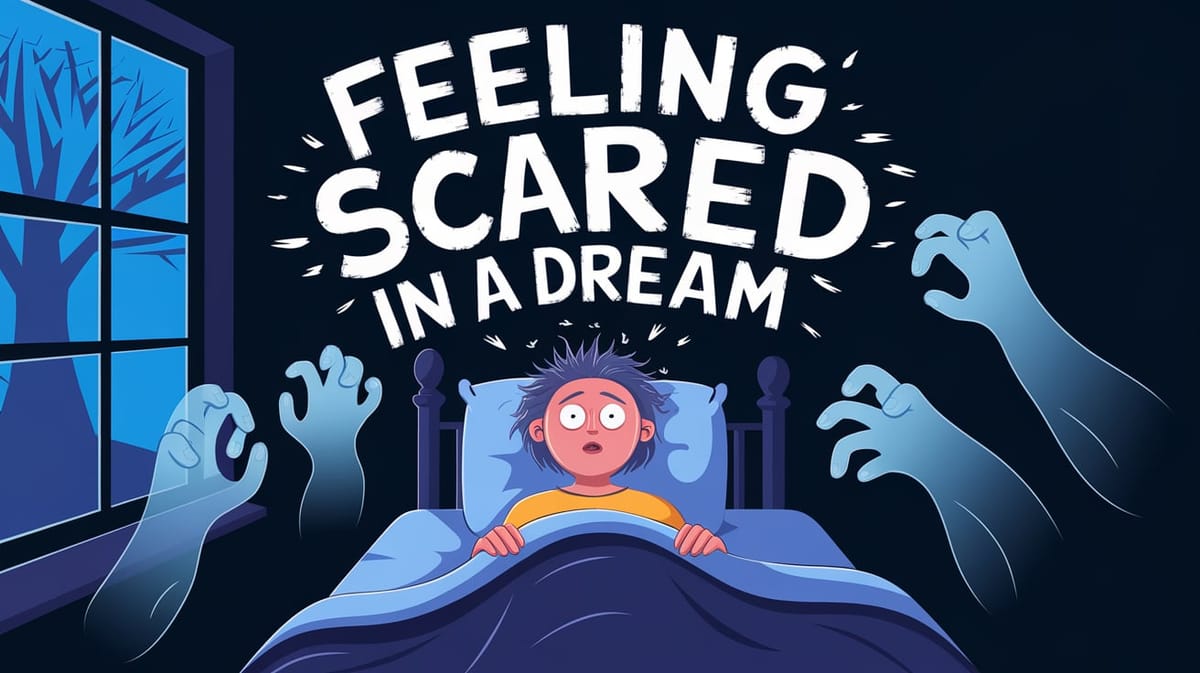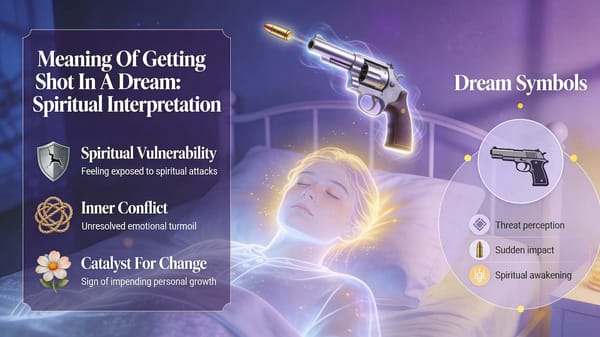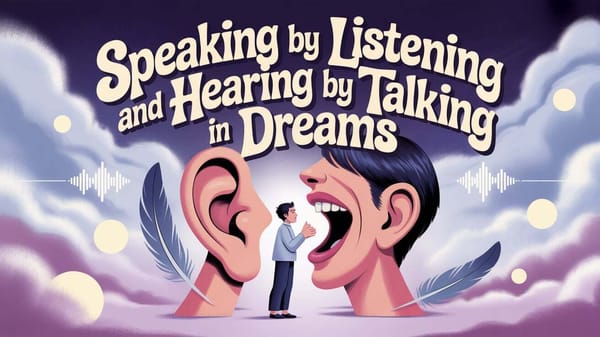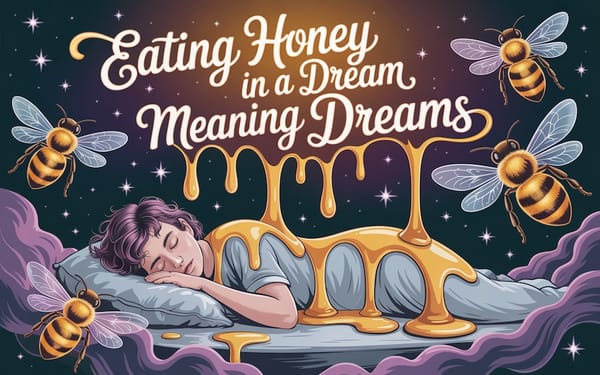Feeling Scared in a Dream: Understanding Nightmares and Fear

In the shadowy realm of slumber, where the boundaries of reality blur and the imagination runs wild, many of us have encountered the unsettling experience of feeling scared. These dreams, imbued with fear and dread, captivate the mind and linger long after awakening. Feeling scared in a dream is a haunting yet revealing occurrence—one that has intrigued humanity for ages. Across cultures and time periods, these dreams resonate as powerful symbols, suggesting deep personal insights and universal themes. But what might they signify?
What Do They Really Mean? Let’s Explore the Symbolic, Psychological, and Scientific Interpretations of This Intriguing Dream
Embarking on a journey through the intricate landscape of dream interpretation, we will unravel the mystery behind feeling scared in a dream. By delving into the symbolic, psychological, and scientific realms, we aim to shed light on this captivating phenomenon.
The Symbolic and Spiritual Significance of Feeling Scared
In the symbolic world of dreams, fear often represents the unknown and the instinctive reaction to potential danger. Feeling scared can symbolize the dreamer's confrontation with aspects of themselves or their life that are fraught with uncertainty. Spiritually, fear can be linked to the darker, unconscious elements of the psyche that demand attention and integration.

Dreams where one feels scared might speak to the dreamer's inner struggle for independence and autonomy. This sensation may echo concerns about stepping away from the familiar, facing the void, and venturing into the unknown. Such dreams can reflect a moment in life where important transitions or decisions are at hand, requiring courage and self-discovery.
What Do Different Feeling Scared Scenarios Mean?
The multitude of scenarios where fear manifests in dreams can offer varied insights into the heart of the matter:
- Being Chased: If the dreamer is running, being pursued by an unknown entity in their dream, it may signify an aspect of themselves or their life they are avoiding or unwilling to confront. The chase represents avoidance, and the pursuer may embody unprocessed emotions or crucial decisions waiting to be acknowledged.
- Falling: Dreams of falling, with a rush of terror gripping the dreamer, often highlight a fear of losing control or failure in some aspect of waking life. This scenario might point towards insecurity and the apprehension of descending into chaos.
- Darkness and Shadows: Feeling scared in dreams where darkness envelops the dreamer may symbolize uncertainties and fears of the unknown. Shadows may hint at parts of the self or narratives that the dreamer is yet to understand or accept, emphasizing the need for introspection and self-awareness.
- Confronting Monsters or Aliens: Encountering grotesque creatures or unfamiliar beings can reflect anxiety about change or the fear of the unfamiliar. This dream scenario may symbolize the dreamer's journey towards accepting new challenges or integrating unknown aspects of their personality.
If you sensing evil in a dream you can also read our dream interpreter.
Psychological Interpretations of Feeling Scared
From the perspective of psychology, particularly within the realms of Freudian and Jungian analysis, dreams where the dreamer feels scared can have profound meanings.

- Freudian Interpretation: Sigmund Freud might suggest that feeling scared in a dream reveals repressed fears and desires. He believed that dreams serve as a safe harbor for subconscious content that is difficult to express in waking life. Scary dreams might mask latent desires wrapped in the guise of fear, manifesting as symbols to navigate personal conflict or taboo thoughts.
- Jungian Perspective: Carl Jung would point to the concept of the shadow—the hidden, darker part of one's personality. Jung believed dreams where fear dominates may indicate the need to reconcile with these shadowy elements. Such dreams could encourage the dreamer to seek balance by acknowledging and integrating these latent aspects properly.
- Reiki Insights: In the realm of Reiki and energy healing, experiencing fear in dreams might signal energy blockages or imbalances in the body's chakras. Scary dreams might prompt the dreamer to engage in practices that restore their energetic balance, such as meditation and chakra cleansing.
Common Causes and Factors Behind Feeling Scared
Many factors can contribute to experiencing fear in dreams. Here are some common triggers:
- Stress: Persistent worry and stress during one's day-to-day life can seep into dreamscapes, intensifying feelings of fear.
- Significant Life Changes: Transitions such as career shifts, moves, or relationship changes heighten feelings of uncertainty, surfacing as fear in dreams.
- Health Anxieties: Concerns about personal or loved ones' health might breed fear that visits in dreams.
- Feelings of Loss or Jealousy: Emotional turmoil tied to loss or envy can manifest as fear, signifying the need for healing and acceptance.
- Unresolved Conflicts: Unaddressed issues in relationships or personal circumstances can surface as fear in dreams, urging resolution.
Scientific Explanations for Feeling Scared in Dreams
While symbolic and psychological interpretations provide insight, scientific perspectives offer explanations rooted in physical processes.

- Physical Sensations: During sleep, the body undergoes changes that can induce experiences of fear. Physiological occurrences, such as increased heart rate or abrupt muscle contractions, might translate as fear within a dream.
- Sleep Disturbances: Conditions like sleep paralysis can blur the boundary between dreaming and wakefulness, often leading to terrifying dream sequences and sensations where one feels scared but unable to move.
- Neurological Factors: The brain's activity during REM (Rapid Eye Movement) sleep is intricate and creative, possibly generating heightened emotions, including fear, as it processes memories and experiences.
Coping Strategies for Feeling Scared in Dreams
For those seeking relief from recurring dreams of fear, here are some effective coping strategies:
- Dream Journal: Maintain a journal to record dreams, noting significant symbols and emotions. Over time, patterns might emerge, offering valuable insights into underlying themes.
- Professional Counseling: If dreams of fear persist or create distress, consider speaking with a therapist who can help navigate their meanings and emotional roots.
- Improved Sleep Habits: Develop a bedtime routine that promotes calmness, such as deep breathing exercises or meditation, to foster restful sleep and healthier dreams.
- Stress Reduction Techniques: Engage in activities that alleviate stress, whether through exercise, mindfulness, or creative endeavors, to reduce fear's influence both in dreams and waking life.
Summary & Final Thoughts
In exploring the complexities of feeling scared in a dream, we've traversed the symbolic, psychological, and scientific terrain to unveil insights into this compelling phenomenon. Dreams are common threads woven through the tapestry of human experience, mirroring emotions, fears, and desires in evocative forms.
As you reflect on your own dreams of fear, consider what they might reveal about your inner world. Are there unresolved conflicts or uncharted territories pleading for your attention? These dreams hold the potential to guide personal growth and fortify self-awareness. Embrace them as windows into your psyche, and let their insights illuminate paths to understanding and healing in your waking life.
FAQ: Understanding Feeling Scared in Dreams
What is the spiritual meaning of feeling scared in a dream?
Feeling scared in a dream often symbolizes a confrontation with unknown aspects or darker sides of oneself. Spiritually, fear in dreams may represent an ongoing inner struggle, signifying a quest for independence or the challenge of facing unfamiliar situations or crucial decisions.
What are the symbolic interpretations of feeling scared in a dream?
Symbolically, fear in dreams can commonly represent avoidance, dread of losing control, or confronting the unknown. Specific scenarios such as being chased, falling, or darkness usually reflect unique personal fears, anxieties, or unprocessed emotions.
How would psychologists interpret feeling scared in a dream?
- Freudian Perspective: Freud might interpret these dreams as manifestations of repressed fears, desires, or conflicts.
- Jungian Perspective: Carl Jung might view fear in dreams as encounter and reconciliation with the shadow self, facilitating the process of individuation.
- Reiki and Energy Healing Perspective: Dreams of fear might act as indicators of energy imbalances needing attention or healing for overall wellbeing.
What are common scenarios of feeling scared in dreams, and what do they mean?
- Being Chased: Implies avoidance behavior or unwillingness to face unacknowledged issues.
- Falling: Highlights fear of losing control or failure; could indicate feelings of insecurity.
- Darkness: Often symbolizes uncertainties, fears of the unknown, or unaccepted parts of the self.
- Confronting Monsters: Reflects anxieties surrounding change, personal transformation, or navigating unfamiliar situations.
What are some psychological factors causing fear in dreams?
High levels of stress, significant life changes, health anxieties, feelings of loss or jealousy, and unresolved conflicts are common psychological factors that can manifest as fear in dreams, signaling a need for resolution.
Are there scientific explanations for feeling scared in dreams?
Yes, sensory experiences during sleep, sleep disorders like sleep paralysis, and brain activity during REM sleep can all contribute to feeling fear in dreams.
What coping strategies can help with recurring dreams of fear?
- Dream Journaling: Keeping a record of dreams can help decipher patterns and recurring themes, providing insights into subconscious processes.
- Professional Counseling: If these dreams cause significant distress or discomfort, consulting a mental health professional can help process those emotions and provide coping strategies.
- Good Sleep Hygiene: Prioritizing good sleep hygiene can minimize sleep disturbances and promote more restful sleep.
- Stress Reduction: Practices like mindfulness, meditation, or yoga can reduce stress and anxiety, potentially decreasing the frequency of fear-based dreams.
How can a dream journal assist in understanding dreams of fear?
Keeping a dream journal allows you to document and reflect on your dreams, revealing recurrent themes, patterns, or emotions. This practice can provide valuable insights into personal fears, anxieties, or unresolved issues and enhance your understanding of their subconscious influences.
When should someone consider professional counseling for scary dreams?
If dreams of fear persistently cause distress, interfere with daily activities, or trigger anxiety or negative emotions, seeing a therapist or counselor can be beneficial. These professionals can provide guidance in discerning the messages in these dreams, as well as help in processing emotional responses.
How do improved sleep habits influence dream experiences?
Developing a consistent sleep routine, cultivating a comfortable sleep environment, and minimizing sleep-disrupting habits can promote better sleep quality and healthy dreaming. A calming bedtime routine can help mitigate anxiety, potentially reducing the frequency of fear-induced dreams.
What is the importance of stress reduction in relation to dreams of fear?
Reducing stress through various techniques can help mitigate the intensity and influence of fear, promoting a sense of balance and calm in both waking life and dreams. Stress management exercises like mindfulness, yoga, or deep breathing can lead to less anxiety-driven dreams and contribute to a healthier mental state.




